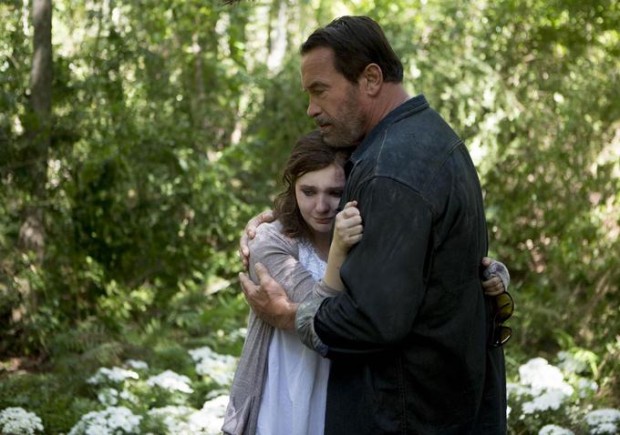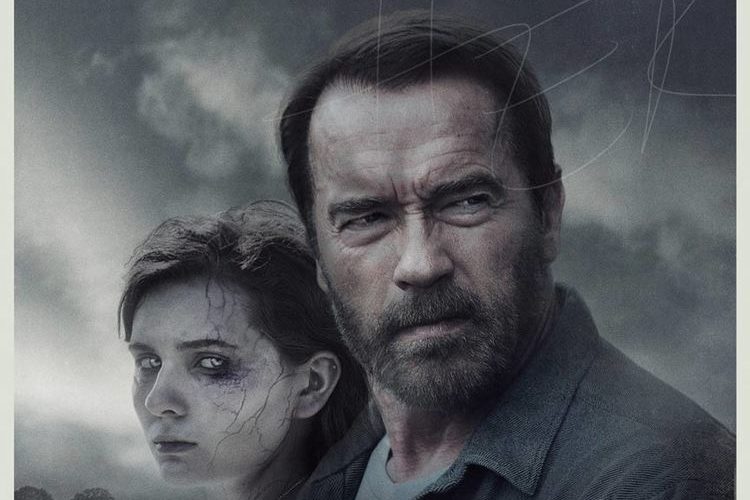A barren post-apocalyptic landscape with spare living humans and dilapidated cities seems to be the prerequisite for the standard zombie feature. It’s clear from the start that Henry Hobson‘s directorial debut, Maggie, has quite different interests. The emotionally dark drama favors a brooding mood and character-centered relationships over jump scares and gore-filled action. While it can often feel formally shapeless, a subdued performance from Arnold Schwarzenegger and an emotionally resonant leading turn from Abigail Breslin make Maggie a somewhat worthwhile genre offering.
Set in a still semi-functioning society, the world has been affected by a disease in which its victims begin to “turn” aka become fully formed zombies in six-to-eight weeks, on average. With working hospitals and a police force, families that have loved ones succumbing to the outbreaks may take care of them until their symptoms become deadly. When the time comes, they are then forced with at least two options: bringing them to a potentially sinister government-sanctioned quarantine area as they wait out the complete “turn” or killing them off before things get worse.

Rather than taking a global or even city-wide look at the events, Hobson keeps things focused on his title character (Breslin), who has been bitten and only has a short stint as a human left. After searching for weeks, her father Wade (Schwarzenegger) locates her and returns to their rural Kansas farm. It’s not a spoiler that the bulk of the film is watching her gradual decline into zombiedom and the effect it has on those surrounding her, including her father, stepmother (Joely Richardson), and friends, one a love interest whom is also afflicted.
Hobson, who has previously worked on various graphic design for The Tree of Life, Snow White and the Huntsman and the Oscars, takes a lyrical approach with handheld camerawork and heavy use of slow-motion in the dim surroundings. While this style is at first a refreshing change of pace for the genre, it soon wears out its welcome, drawing out the proceedings and diminishing the immediate emotional impact. There’s also the unnecessary flashbacks to Maggie’s attack, which come off a cheap gestures to wake up the audience rather than to give any depth to her character.

Affecting performances from Schwarzenegger and Breslin help to carry what’s there though, as the former displays genuine tenderness towards his ailing daughter, succumbed by the internal battle of her inevitable fate. Featuring only a few brief moments of discernible action, it’s his first fruitful role in many years, showing a kindheartedness that hopefully marks a transitional period to more substantial roles. Meanwhile, Breslin does well with the majority of screentime, as she says goodbye to her loved ones and an unfulfilled life. Thanks to some top-notch effects work, Maggie’s diminishing health is gruesomely conveyed with a pitch-black wound on her arm. One particularly grisly sequence involves a self-administered “operation” to remove one’s phalanges.
While the genre-defying elements of John Scott 3′s script are commendable, the unrelenting dourness in both the written word and Hobson’s aesthetic approach soon tips the scales to dramatically inert territory. Thanks to their performances, we never question the bond between Maggie and Wade, but the story’s structure as a waiting game isn’t as fully explored as it perhaps should’ve been. We witness a few noteworthy exchanges between the leads in this cancer allegory, but with Hobson’s attempt for realism, we’d imagine there are more substantial conversations to be had if the end was near. With a rushed, abrupt finale, Maggie isn’t altogether satisfying, but with committed performances, it does prove there are other productive avenues to take the zombie genre.
Maggie premiered at Tribeca Film Festival and opens on May 8th.

